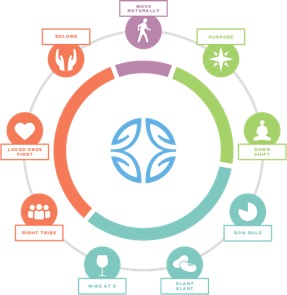
There are several places in the world where living to be over 100, with a healthy body and mind is the norm. Deemed, the Blue Zones, these rare longevity hotspots around the world are located specifically in Okinawa (Japan), Sardinia (Italy), Nicoya (Costa Rica), Icaria (Greece), and Loma Linda, CA (US).
National geographic journalist, Dan Buettner, and a team of medical researchers, anthropologists, demographers, and epidemiologists took to studying exactly what could be contributing to these longer life spans by looking at the lifestyles and environments within these hotspots. Several key themes emerged, and nine common denominators were derived from the studies that are believed to contribute to the longer life spans experienced.
1. Move Naturally
Movement is a regular part of the everyday culture and life in the blue zones. No matter their age, Buettner noted that all residents were seen moving throughout their communities and/or performing physical labor daily. Movement wasn’t seen as a daily chore or task to check-off, it was embedded within the lifestyle of residents in these communities. As we’ve slowly engineered physical activity out of our culture here in the US, becoming a much more sedentary society, it’s up to us to make sure we are moving more throughout the day. If you live a primarily sedentary lifestyle (i.e., sitting in front of a computer all day, driving for extended periods of time), it’s recommended for every 20-30 minutes sitting to get up and move around. So, BRB, I’m getting up to move now.
2. Purpose
You’ve likely heard by now of studies finding that optimists are more likely to live longer than those who practice little positive thinking. When someone is living a life on purpose and feel they are making positive contributions to the world and/or their life is meaningful to them, they are more likely to feel in control of life circumstances, bounce back quicker from adversities and overcome stressors, leading to greater regulation of emotions and behavior. Knowing your sense of purpose is said to add up to seven years to your life.
3. Downshift
Blue Zone communities make time every day for stress management. Whether its eating nourishing foods or getting a full night’s rest, managing stress is key to living a happier, healthier and more productive life.
4. 80% rule
Put down that fork when you are 80% full to avoid overeating. Blue zone residents are known to monitor their portion sizes and time their meals out to have their largest meal in late afternoon/early evening, as opposed to right before bed, which has been associated with weight gain.
5. Plant Slant
Focus your meals around plant-based foods and reduce meat consumption. Blue zone communities eat meat an average of only five times per month or on special occasions. In China’s longevity village, residents pick their own produce and eat it the same day. A good practice to slowly integrate more plant-based meals is trying Meatless Mondays. For easy recipes, visit MedInsteadofMeds.com.
6. Wine @ 5
Alcohol is consumed in moderation, and in many blue zone hot spots, residents can be seen regularly having one to two glasses of wine a day with friends or with food. Light drinking, generally wine, has been linked with a longer lifespan.
7. Belong
Find your people. Having a sense of community, whether it be a faith-based community, meaningful relationships at work, and social relationship, are associated with more positive and healthy habits. Find somewhere where you feel a sense of belonging, trust, and purpose. There are many studies that demonstrate that having friends and loving relationships resulting in lower rates of hypertension, obesity, diabetes and possibly even cancer.
8. Loved ones first
Blue zone families tend to live closer geographically and are generally more emotionally connected and supportive of one another. It’s common for younger generations to take care of their elders, which leads to a healthy aging infrastructure that increases health and promotes a sense of belonging on multiple levels. In the blue zones, residents generally have a committed life partner and prioritize investing time and love into their children and family.
9. Right Tribe
Blue zone residents are socially connected and regularly participate and connect within their community. Being born into and staying socially connected within communities supportive of positive health behaviors is more likely to shape and retain positive lifestyle behaviors for many generations.
While these may seem like simple lifestyle changes, it can be difficult to sustain these positive habits over time. We’re compounded daily with stressors, lack of time, unexpected events that add up and can disconnect you from living in the flow of life where these lifestyle behaviors come much more intuitively. Be graceful with yourself and start small, maybe take a walk at lunch instead of staying in front of your computer, call a friend on your ride home instead of mindlessly listening to a Podcast or playlist, take time to journal and find what makes life so meaningful to you and go after it.
Don’t miss another great blog: Subscribe Now
